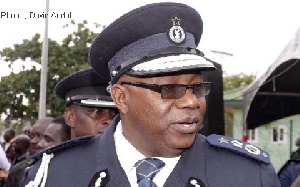- Home - News
- TWI News | TV
- Polls
- Year In Review
- News Archive
- Crime & Punishment
- Politics
- Regional
- Editorial
- Health
- Ghanaians Abroad
- Tabloid
- Africa
- Religion
- Election 2020
- Coronavirus
- News Videos | TV
- Photo Archives
- News Headlines
- Press Release
General News of Wednesday, 30 September 2015
Source: The Finder
Unease in police service over Deputy IGP post
An uneasy calm is brewing in the Ghana Police Service, especially among the top hierarchy, over the failure of the Police Council to appoint a Deputy Inspector General of Police (IGP) since 2012.
The vacancy has been described as a clear disregard for the Police Service Regulation C.I. 76, which states that “the Inspector General shall be assisted by the Deputy Inspector General of Police.”
Checks by The Finder have revealed that since Mr Mohammed Ahmed Alhassan was appointed as the Inspector General of Police, he has not had a deputy.
Just like any top position, it was expected that a deputy would be chosen to assist, and in extreme circumstances, perform the duties of IGP when the need arises.
Since the IGP took office in June 2013, there has been no deputy despite the fact that Mr Alhassan was once a Deputy Inspector General of Police.
Per C.I. 76, the Deputy IGP shall supervise, control, monitor and provide the day-to-day management of all schedules and command, and shall report to the IGP.
In rank and command, Commissioner of Police (COP) Joana Osei-Poku, Director-General of the Police Intelligence and Professional Standards (PIPS) Bureau, is next to the IGP.
As a result, some police officers assume that she is the Deputy IGP.
However, some senior officers differ on that assumption because they are of the view that COP Osei-Poku has not been appointed by the Police Council and officially inducted into office in accordance with C.I. 76.
In the same document, the President is the appointing authority as stipulated in the 1992 Constitution.
“In accordance with Article 202(3) of the 1992 Constitution, the power to appoint a person to hold or act in an office in the service shall vest in the President, acting in accordance with the advice of the council,” Police Service Regulation, 2012.
Senior police officers who spoke on condition of anonymity said the presence of a Deputy IGP determines who becomes IGP when the substantive IGP retires, though the position of IGP is largely a political appointment.
This, they said, curbs unnecessary lobbying for the post of IGP any time a substantive IGP retires.
From Mr Patrick Kwateng Acheampong’s office, Mrs Elizabeth Mills-Robertson took over as a deputy. Mr Paul Tawiah Quaye also took over from Mrs Robertson, and Mr Mohammed Ahmed Alhassan also took over as IG from Mr Quaye in the capacity of a deputy.
Though not a must for the Deputy IGP to succeed the incumbent should he leave office, it would be mundane to bypass a Deputy IG and go for a COP, since the deputy’s rank and status in the service would be considered.











